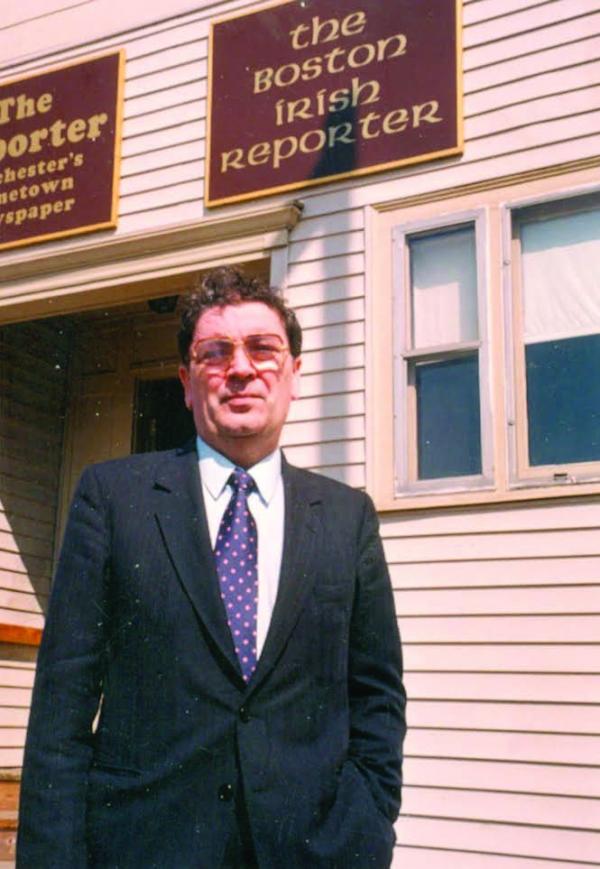August 13, 2020

John Hume visited the Reporter’s office in 1992. The newspaper was then located on Neponset Avenue. Ed Forry photo
During the years that I spent traveling to Northern Ireland writing about the bitter and violent Troubles and the peacemaking efforts aimed at bringing it all to an end, people would often theorize that time spent there must have been filled with angst and unease.
Wasn’t it scary to be in Northern Ireland? The short answer is no, although there is an episode that comes to mind.
The year was 1993, the place was Derry, and John Hume was at the wheel, conducting a breakneck tour of the city, showing an American reporter the places where US companies like Fruit of the Loom and Seagate were already operating, and sites that other firms should be eyeing.
Hurtling down bumpy streets in a very small car, we are taking turns that we shouldn’t be taking, advancing where we should be yielding, and generally seeming to be throwing caution to the damp Derry wind.
Ever afraid in Northern Ireland? Well, maybe.
But to be fair, it also has to be understood that the driver -- a member of the British and European parliaments, decades into peacemaking efforts that in five years would bring him the Nobel Peace Prize, probably engaged in backchannel talks with Gerry Adams, Martin McGuinness and the IRA – probably had a lot on his mind.
While it may seem bizarre that the man named “Ireland’s Greatest” person in a 2010 poll was intent about giving an American reporter an “open for business” tour of his beloved Derry, if you step back, it makes perfect sense.
As much as he was a peacemaker and, in the words of The Guardian newspaper, a “secular saint,” John Hume, who died on Aug. 3 at 83, was a pragmatist, a local MP who was all about stoking the economy and creating jobs.
Many of his most memorable aphorisms, key points from his “single transferable speech,” made the connection between the economy and peace.
John Hume delivered few major speeches without noting the time when his father, watching unionists and nationalists in a flag-waving duel, had warned him: “Don’t you get involved in that stuff, son.”
In an interview conducted for the Nobel Foundation, Hume picks up the story: “I say, ‘Why not, dad?’ and he says, ‘You can’t eat a flag.’ In other words, what he was saying is real politics is about the living standards, about social and economic development. It’s not about waving flags at one another.”
The former leader of Northern Ireland’s Social Democratic and Labor Party also frequently spoke about the desirability of reaching the point where “we can leave aside our quarrel while we work together in our common interest, spilling our sweat and not our blood.”
As was widely noted in the tributes and media reports following his death, John Hume was the architect of the Northern Ireland peace process. He was the father of the 1998 Good Friday peace agreement that essentially brought the North’s long-running Troubles to an end.
His concept of a grand compromise, of a power-sharing government, of an outcome where no one would win but no one would lose, essentially emerged in the 1970s, and he voiced his ideas for the next 20-plus years. The core concepts never changed – he just needed everyone else to catch up.
“I am a teacher,” he once noted, referring to the profession he entered after graduating from college. “You keep saying the same things over and over. Then you know you’re getting through when someone in a pub gives you back your own words.”
There’s something else to think of when you consider John Hume: Courage. As in incredible, raw courage.
Another time, another car, but the place is still Derry.
I had arrived a few minutes early for an interview, so I parked in front of his home and was chilled by what I saw: a simple house on a crowded, middle-class street – no gate, no guard, but big windows and the front door just footsteps away.
Given that this was the home of a man whose views at times had antagonized paramilitaries on both sides of Northern Ireland’s sectarian divide, a man who often traveled on his own and almost always without security, the scene seemed horrifyingly dangerous.
Then I realized that beneath John Hume’s shy, school-teacher exterior there was an undercarriage of steel, and what he was saying was: Everyone knows what I think; here’s where I live; I am willing to risk it all for peace.
This man of courage and audacity delivered peace – at no small cost to himself, with the past 20 years being a time of physical and cognitive decline. Many people are alive today because of him. Northern Ireland has hope because of him.
In reflecting on his accomplishments, a Derry woman born the year after the Good Friday agreement was signed said that John Hume gave the young people of the North “a future we could look forward to.”
Isn’t that what he was always aiming to do? Wouldn’t those words make John Hume smile?
Robert Connolly reported from Northern Ireland for the Boston Herald and the Boston Irish Reporter. He is the writer and co-director of “The Road to Reconciliation,” a Northern Ireland-based documentary that aired nationally on public television and now works on a consulting basis for the UMass President’s Office.


